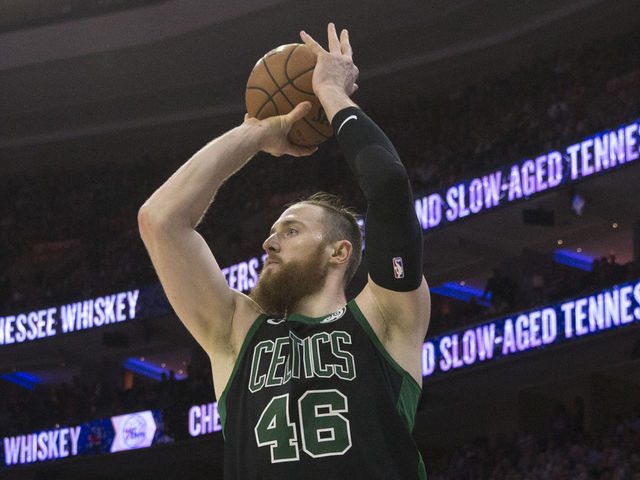Baynes' newly discovered 3-point range could be X-factor for Celtics

Playing for his third team in four seasons, it would've been easy to write off 6-foot-10 center Aron Baynes as a journeyman backup. Yet the 31-year-old brute has the potential to be a difference-maker for the Boston Celtics in the Eastern Conference finals.
Unlike his higher-profile teammates - even late-season breakout Terry Rozier, who's long been treasured by Boston's front office - Baynes' recent performances have been entirely unexpected, as he's miraculously discovered a dependable 3-point stroke.
Through the first 409 games of his career (including postseason appearances), Baynes connected on six total 3-pointers. He's more than doubled his career output over the last five games, hitting 7 of 16 (43.8 percent) against the Philadelphia 76ers. All seven makes came from the corners (5 of 7 in the right corner, 2 of 5 in the left), either because weak-side defenders helped away from Baynes, or just flat-out dared him to shoot.
And that's just fine with the Celtics. If Baynes can be a capable threat in the most efficient 3-point zone while staying clear of the paint so the guards and wings can drive, opposing defenses will be forced to make tough decisions about how they stagger their lineups. Will the Cavaliers allow Kevin Love or Tristan Thompson to track Baynes 20 feet from the hoop, negating some of their strengths on the glass? Will they opt to guard him with smaller, more athletic options like Jeff Green, knowing the loss of size on the floor is asking for trouble on defense and on the boards?
The Celtics were actually worse against the Sixers when Baynes was on the floor, giving up a minus-11 net rating per 100 possessions in 118 minutes. However, that number obscures some of the benefits of using the Aussie as a stopgap option while giving Al Horford some much-needed rest. Horford spent most of the last series tied to the hip of Joel Embiid or Ben Simmons, so getting him off the floor is critical in order for the Celtics to have their best five-man lineups rested and ready for crunch time. (In any case, it's little surprise that the Celtics suffer when their best frontcourt defender - and arguably their best passer - is catching a breather.)
But not all lineup configurations including Baynes have been abhorrent. Lineups featuring Baynes and Jayson Tatum, his most frequent partner during the past five games, posted a slightly above-neutral net rating of 0.3 points per 100 possessions in 171 minutes. The quintet of Baynes, Tatum, Rozier, Horford, and Jaylen Brown had a net rating of 3.8 points in 44 minutes; Baynes, Brown, Tatum, Marcus Morris, and Marcus Smart boasted a net rating of 13.3 in 27 minutes.
Does Baynes possess the raw athleticism and skill to defend LeBron James for prolonged stretches? Heck no, but no one really does. The task facing Baynes - and the entire LeBron defense committee - is making sure James doesn't manage to collapse the defense on every single possession. Even that's easier said than done, but grinding the Cavaliers' reignited offense to a halt for just a handful of possessions per game could be the difference between a four-game sweep and a competitive series.
Baynes will be a free agent this summer, and these glimmers of a potential new dimension to his game may have priced him out of Boston's future. In the interim, at least, it doesn't matter. If the Aussie can do enough with the margins he's afforded to catch the Cavaliers off guard, the Celtics might be able to pull off their most miraculous upset yet.